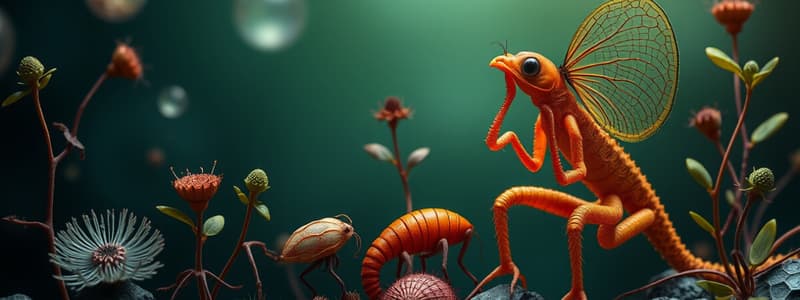Podcast
Questions and Answers
Which of the following is NOT one of the eight qualifications that define living things?
Which of the following is NOT one of the eight qualifications that define living things?
- Reproduction
- Ability to learn (correct)
- Adaptation
- Cells
What is the first step of the scientific method?
What is the first step of the scientific method?
- Formulate hypotheses
- Observation (correct)
- Conclusion
- Test the hypothesis
Which type of data is primarily concerned with numerical values?
Which type of data is primarily concerned with numerical values?
- Descriptive data
- Quantitative data (correct)
- Experimental data
- Qualitative data
Which of the following is an example of a hypothesis?
Which of the following is an example of a hypothesis?
What is the main purpose of organizing data into a table?
What is the main purpose of organizing data into a table?
Which step follows 'Formulate Questions' in the scientific method?
Which step follows 'Formulate Questions' in the scientific method?
What distinguishes a law from a theory in scientific terminology?
What distinguishes a law from a theory in scientific terminology?
What is a common source of bias in scientific research?
What is a common source of bias in scientific research?
Flashcards are hidden until you start studying
Study Notes
Definition of Biology
- Biology is the study of living organisms and the interactions between them and their environments.
- Includes various branches such as zoology (animals), botany (plants), microbiology (microorganisms), and ecology (ecosystems).
Types of Living Things
- Animals: Multicellular organisms that consume organic material for energy and typically have specialized sensory organs.
- Plants: Multicellular organisms that produce their food through photosynthesis and have a rigid cell structure.
- Fungi: Organisms that decompose and absorb nutrients from organic material, not classified as plants or animals.
- Bacteria: Single-celled microorganisms that can be beneficial or harmful.
Eight Qualifications of Living Things
- Cells: Basic unit of life; all living things are made up of at least one cell.
- Reproduction: Ability to produce offspring; can be sexual or asexual.
- Metabolism: All biochemical processes occurring within an organism to maintain life; includes energy production and nutrient processing.
- Homeostasis: Regulation of internal environment to maintain stable conditions despite external changes.
- Growth and Development: Increase in size and complexity throughout an organism's life cycle.
- Response to Stimuli: Ability to react to environmental changes or factors.
- Adaptation: Genetic changes in populations over time that enhance survival in specific environments.
- Organization: Structured arrangement of living things, from cells to tissues to organs and systems.
Importance of Studying Biology
- Understanding the living world informs practices in health, agriculture, and environmental conservation.
- Biology helps us understand life processes, disease mechanisms, and the ecological impact of humans.
Methods of Studying Biology
- Involves experimentation, observation, classification, and analysis of living organisms.
- Utilizes scientific tools, lab experiments, and field studies to gather data.
Scientific Method Steps
- Observation: Gathering information through the senses or instruments.
- Question: Formulating specific inquiries inspired by observations.
- Hypothesis: Developing a testable prediction based on gathered information.
- Experimentation: Conducting trials to test the hypothesis through controlled methods.
- Data Collection: Gathering evidence and observations from the experiments.
- Analysis: Interpreting the data to see if it supports or refutes the hypothesis.
- Conclusion: Summarizing findings to determine the validity of the hypothesis.
- Communication: Sharing results with the scientific community.
Bias and Hypothesis
- Bias: A preconceived tendency that might influence interpretation of data or results.
- Hypothesis: An educated guess that offers a potential explanation for an observation.
Conclusion of the Scientific Method
- Draws results from the data analysis, affirming or rejecting the hypothesis.
- May lead to further questions or more refined hypotheses.
Theory vs. Law
- Theory: A well-substantiated explanation of some aspect of the natural world, based on a body of evidence.
- Law: A statement that describes an observable phenomenon, typically expressed mathematically.
Asking Scientific Questions
- Use observations to spark curiosity and formulate engaging questions.
- Include multiple senses to enhance the inquiry process.
Experimentation & Data Collection
- Research aspect aims to gather evidence supporting or disproving hypotheses.
Types of Experimentation
- Experimental: Controlled experiments that establish cause and effect relationships (e.g., drug efficacy tests).
- Observational: Non-manipulative studies that observe natural settings (e.g., ecosystem interactions).
Qualitative vs. Quantitative Data
- Qualitative Data: Descriptive information without numerical values (e.g., color, texture).
- Quantitative Data: Numerical information that can be measured (e.g., height, weight).
Purpose of Data Tables
- Organize data systematically for analysis and comparison.
- Enhance clarity and facilitate easier interpretation of findings.
Types of Variables
- Independent Variable: The factor manipulated in an experiment to observe its effect.
- Dependent Variable: The outcome measured in response to the changes in the independent variable.
- Controlled Variables: Constant factors kept the same throughout the experiment for fair testing.
Studying That Suits You
Use AI to generate personalized quizzes and flashcards to suit your learning preferences.




